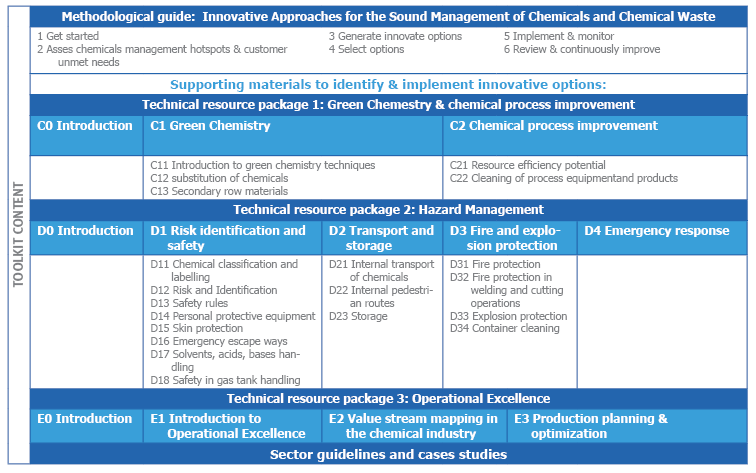
The toolkit “Innovative Approaches for the Sound Management of Chemicals and Chemical Waste” (IAMC), developed in a framework of the UNIDO project*, aims to facilitate the implementation of innovations in the production and application of chemicals in order to reduce the consumption of chemicals, energy and water while improving the sound management of chemicals and reducing risks related to chemical accidents.
The toolkit enables technical and business consultants to support manufacturers and industrial users of chemicals to systematically identify chemicals management hotspots and implement innovations which provide customers value and increase revenue while providing environmental benefits and protecting the health of workers and society. More benefits…
The toolkit consists of a company guide, that provides a methodological approach in the form of six phases, supplemented by technical resources, sector guidelines and case studies.
Technical resource packages offer a wide range of technical solutions on the topics: Green Chemistry and chemical process improvement, Hazard Management, and Operational Excellence. Additional technical resources are available in the form of sector guidelines, which target specific subsectors in the chemical industry (e.g. synthesis of polymers). Case studies of completed projects demonstrate the benefits resulting from applying the IAMC methodology.
Read the IAMC brochure in English / in Spanish.
This toolkit was developed and refined through a participatory and interative process. The following contributors are specifically acknowledged: Craig Hawthorne (ISSPPRO.de), David Piper (UNEP), Antoine Indaco and Francesca Gambazzi (CSD.ch). The valuable inputs were received from National Cleaner Production Centres (NCPCs) of Egypt, Peru, El Salvador, Guatemala, Colombia. The toolkit development process was supported by Branko Dunjic (NCPC-Serbia) and Maria Grineva (UNIDO). This project was made possible with the funding from the State Secretariat for Economic Affairs (SECO), Government of Switzerland.